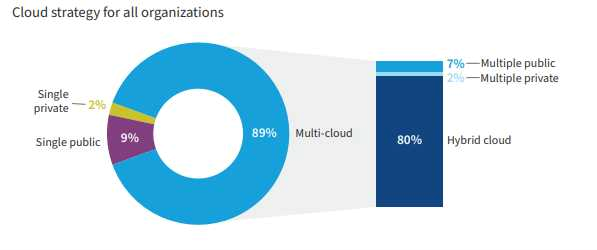Can Your Business Really Run on Multi-Cloud?

Cloud computing has become an essential business asset in recent years as businesses look for ways to cut costs and increase efficiency. Most organisations use more than one cloud, creating a multi-cloud environment – which involves using a combination of different public and private cloud infrastructures in a single heterogeneous architecture. This improves cloud infrastructure capabilities and cost. The theory is that this will provide greater flexibility, capability, and resilience and reduce the risks associated with relying on a single cloud vendor.
According to the Flexera 2022 State of the Cloud Report, which surveyed 753 cloud decision-makers, 89 percent of enterprises have a multi-cloud strategy. Multi-cloud appears to be the standard approach to cloud infrastructure right now, although how companies get to multi-cloud varies based on their requirements and the mix of providers they pick. The majority take a hybrid approach by combining both public and private clouds.
However, despite the deep penetration, multi-cloud can be difficult to implement and manage, and there are still some concerns about its feasibility.
In this blog post, we explore the case for multi-cloud and discuss the current approaches to implementing a multi-cloud strategy.
The Advantages of Multi-cloud Deployments.
Multi-cloud provides enterprises with several advantages. The following are some of the main benefits:
- Pick and choose components from multiple vendors: The multi-cloud approach gives enterprises the freedom to select the best components from different vendors to create a unique combination that meets their specific needs. This à la carte approach contrasts with the single-cloud approach, where businesses are locked into using the products and services of a single vendor.
- Cost savings: Another advantage of multi-cloud is that it can help enterprises save money. By using a multi-cloud approach, businesses can avoid the high costs of single-cloud deployments, such as licensing fees and vendor lock-in. In addition, multi-cloud can help companies optimise their IT spending by allowing them to use only the resources they need from each cloud provider.
- Improve engineering speed: Multi-cloud also leads to faster engineering speed, for example, in deployments where staff have the freedom to use the tools and environment they prefer. This approach allows businesses to prototype and deploy new applications and services quickly.
- Legal compliance: Multi-cloud can also help businesses meet their legal compliance obligations. By distributing data and applications across multiple cloud providers, companies can reduce the risk of data loss and ensure that they have a backup in case of problems with one provider. It also ensures they don't run afoul of data sovereignty laws such as GDPR. Many jurisdictions worldwide require that data controllers keep data within the country of origin.
Improve customer experience: Multi-cloud can also help businesses improve the customer experience. By adopting a multi-cloud strategy, organisations can ensure their apps and services are always available, even if one cloud provider experiences an outage. In addition, multi-cloud can help businesses deliver a more personalised experience to their customers by allowing them to use data from multiple sources.
Should My Business Adopt a Multi-cloud Approach?
Multi-cloud is not a one-size-fits-all solution, and it's essential to understand the pros and cons before deciding if it's right for your business. In addition, the multi-cloud approach can be complex and challenging to manage, so it's crucial to have the right tools, processes, and expertise.
zsah can help enterprises deploy a multi-cloud solution and enjoy the full benefits of multi-cloud. Our innovative Gridz multi-cloud management platform enables businesses to manage multi-cloud deployments from a single pane of glass. It provides businesses with the ability to automate tasks, eliminating the complexity of managing multi-cloud. You can provision, monitor, and scale with ease. In addition, our platform provides businesses with the means to deploy and manage containerised apps across several cloud environments.
If you're considering multi-cloud for your business, we can help you reap the full benefits. Contact us today to learn more.


